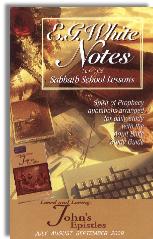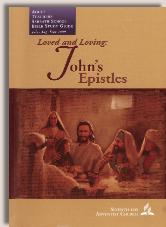|
||||||||||||||
Commentary on "John's Letter to the Chosen Lady"
Day 3: Monday, September 14, 2009
Walking in truth
The lesson’s discussion on verse 4 is good, but I want to add some important thoughts.
First, the apostle is “very glad to find some of [the lady’s] children walking in truth” because of the prevalence of false teachers. The Bible records that the apostles’ greatest fear was that the believers they loved would be led astray from the truth. Paul writes in one of his letters to the Corinthian church:
For I am jealous for you with a godly jealousy; for I betrothed you to one husband, so that to Christ I might present you as a pure virgin. But I am afraid that, as the serpent deceived Eve by his craftiness, your minds will be led astray from the simplicity and purity of devotion to Christ. For if one comes and preaches another Jesus whom we have not preached, or you receive a different spirit which you have not received, or a different gospel which you have not accepted, you bear this beautifully (2 Corinthians 11:2-4; emphasis mine).
Notice the phrase “simplicity and purity of devotion to Christ.” The essence of false teaching is to detract and distract from simple and pure devotion to Christ. Paul writes to the Galatian church:
I am amazed that you are so quickly deserting Him who called you by the grace of Christ, for a different gospel; which is really not another; only there are some who are disturbing you and want to distort the gospel of Christ. But even if we, or an angel from heaven, should preach to you a gospel contrary to what we have preached to you, he is to be accursed! (Galatians 1:6-8)
Some Judaizers, as they are commonly called, had deceived the Galatian church into believing that keeping the Jewish law (Paul calls it “works of the Law”) was God’s requirement of them, rather than believing and trusting in Jesus alone. Paul writes that those who are under the law are under a curse, and that Christ redeemed us from the curse of the law, that we might live by faith. In light of the heresy that had taken hold of this church, Paul writes, “You observe days and months and seasons and years. I fear for you, that perhaps I have labored over you in vain “(Galatians 4:10-11; emphasis mine).
If the truth is what sets us free (John 8:32), then lies are really what put us in bondage. Throughout the New Testament, the apostles warn us repeatedly about false teachers. In fact, nearly every book in the New Testament contains one or more warnings about false teachers and their teachings. Considering the danger and the apostles’ earnest desire for the believers to walk in truth, it is no wonder that John writes that he is “very glad to find some of [the lady’s] children walking in truth.” In fact, John also wrote this amazing statement in 3 John: “I have no greater joy than this, to hear of my children walking in the truth” (3 John 4).
Second, the commandment to walk in truth is best described as a command to abide (or remain) in Jesus, who is the truth embodied. To abide in Jesus means to stay in close, loving relationship with Him. Jesus describes this wonderful relationship in John’s gospel:
Just as the Father has loved Me, I also have loved you; abide in My love. If you keep My commandments, you will abide in My love, just as I have kept My Father’s commandments and abide in His love. These things I have spoken to you so that My joy may be in you, and that your joy may be full (John 15:9-11).
The relationship between the Father and Jesus is full of infinite, overflowing love and joy; for Jesus to say that he has loved us as the Father has loved him is astounding – this is the love between members of the Trinity, the Almighty God! Jesus then tells us how our relationship to him is maintained, just as his relationship to the Father is maintained: by obedience to his commandments. This is obedience to a person, not to a written code. Obedience to a person is a place of intimacy and joy; whereas obedience to a written code is a place of wrath and condemnation.
What are his commandments?
The lesson carries a false assumption: that the “commandments” from verse 6 are the Ten Commandments from the Law of Moses. Besides the fact that John explicitly and repeatedly states what Jesus’ commandments are – simply that we believe in Him and love one another (see John 13-15; 1 John 2:17-11; 1 John 3:11-24, especially v. 23; 1 John 4:7-5:5; 2 John 5-6), the apostle John makes a clear distinction in his writings between the Law of Moses and the commandments of Jesus. John writes in the first chapter of his gospel:
For the law was given through Moses; grace and truth were realized through Jesus Christ (John 1:17).
The word translated to “law” here is the Greek word nomos. Throughout his writings, John uses the word nomos to refer to the Jewish scriptures (our Old Testament), which includes the Law of Moses and the Ten Commandments. Jesus refers to the law (nomos) several other times as he speaks to the Jews:
Did not Moses give you the law (nomos) and yet none of you carries out the law (nomos)? (John 7:19)
Even in your law (nomos) it has been written that the testimony of two men is true (John 8:17).
In contrast, references in John’s writings to Jesus’ commands to us always use the Greek word entole, which can be translated as commandment, command, or precept. The word entole in John’s writings does not refer to the Law of Moses or the Ten Commandments.
A new commandment (entole) I give to you, that you love one another, even as I have loved you, that you also love one another (John 13:34).
If you love Me, you will keep my commandments (entolas) (John 14:15).
If you keep my commandments (entolas), you will abide in My love; just as I have kept my Father’s commandments (entolas) and abide in His love (John 15:10).
In 2 John, entole is the word that is translated to commandment/commandments in verses 5 and 6.
Now I ask you, lady, not as though I were writing to you a new commandment (entole), but the one which we have had from the beginning, that we love one another. And this is love, that we walk according to His commandments (entolas). This is the commandment (entole), just as you have heard from the beginning, that you should walk in it (2 John 5-6).
Clearly, John is not speaking of the Law of Moses or the Ten Commandments when he uses the word commandments (entole), but of Jesus’ personal, direct commands to us to believe in him and to love one another.
Summary
- John is “very glad” to hear that some of the lady’s children are walking in the truth because false teachers are prevalent, the apostles’ greatest fear is that false teachers will lead the believers astray, and John’s greatest joy is to hear that his children (believers) are walking in truth.
- The commandment to walk in truth is essentially a commandment to abide in Jesus, to maintain our relationship to him.
- We maintain our relationship to Jesus by obedience; this is obedience to the person of Jesus (which is a place of special intimacy), not to a written code. This relationship parallels Jesus’ relationship to the Father, in which he obeyed the Father and remained in the Father’s love.
- The word “commandments” in verses 5-6 is not referring to the Ten Commandments or the Law of Moses; rather, it refers to Jesus’ commands to believers who are under the New Covenant.
Copyright 2009 BibleStudiesForAdventists.com. All rights reserved. Revised September 14, 2009. This website is published by Life Assurance Ministries, Glendale, Arizona, USA, the publisher of Proclamation! Magazine. Contact email: BibleStudiesForAdventists@gmail.com.
The Sabbath School Bible Study Guide and the corresponding E.G. White Notes are published by Pacific Press Publishing Association, which is owned and operated by the Seventh-day Adventist church. The current quarter's editions are pictured above.
Official Adventist Resources
Standard Edition Study Guide Week 12
Teacher's Edition Study Guide Week 12
Easy Reading Edition Study Guide Week 12
Search the Complete Published Ellen G. White Writings


